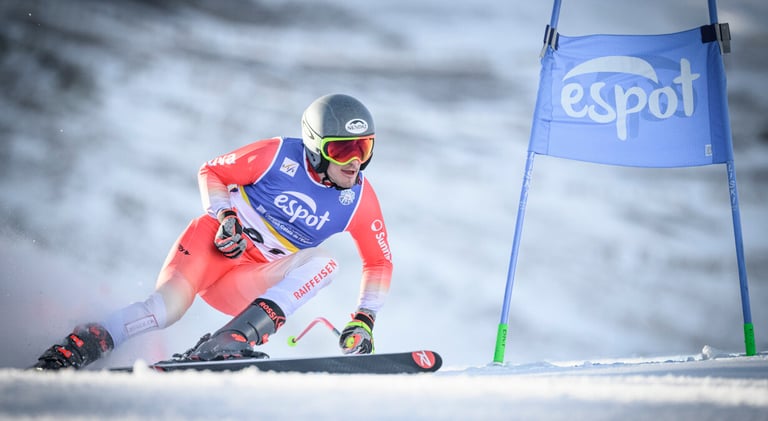More than meets the eye Triumphing with an invisible disability

By Cape Capital
31.10.2024

Théo Gmür’s remarkable journey in alpine skiing transcends his triumphs at the Winter Paralympics. His story of resilience, inclusion, and overcoming the challenges of cerebral palsy inspires us to embrace diversity and redefine what’s possible, on and off the slopes.
"Yes, of course, the medals count at the end of the journey, but it's also good to be a voice for people with disabilities," says Théo Gmür, a parasport skier who won gold for Switzerland in three standing divisions of alpine skiing (downhill, super-G and giant slalom) at the 2018 Winter Paralympics in South Korea. He also won a bronze in the 2022 Winter Paralympics in Beijing, China.
A life-changing diagnosis and the journey to skiing
Théo has cerebral palsy (CP), which can sometimes appear to be an invisible disability. Theo's condition appeared when he was two years old in 1998. "I went to sleep one night and woke up the next morning with the entire right side of my body paralysed," he says.
The main types of CP include ataxic, athetoid, spastic, hypotonic and mixed, and the classification depends on which body parts are affected and the limitations of mobility. Théo has hemiplegia on one side of his body, which affects balance, strength and coordination between his lower and upper body.
After a month in the hospital to determine the cause of his condition, the young child returned home to his family in Haute-Nendaz, a small ski resort in the Swiss Alps in the Canton of Valais. The town is central to the Four Valleys ski area, which includes Siviez, Thyon, Vesonnaz and Verbier.
So, as Théo says, "It was natural to go skiing in my hometown, so I got my first pair of skis a year later when I was three years old. We skied a lot together as a family – every Saturday and Wednesday after school. It was a regular part of our lives."
He always wanted to follow his older brother, Thomas, down the runs. His parents encouraged him to follow the same route, and always tried to match him with non-disabled skiers. His brother is now a successful middle-distance competitor.
However, at school, Théo was very aware of his physical limitations and how they stopped him performing tasks as easily as his peers.
"It affected me physically and impacted me mentally, especially at school. Kids can be unfiltered, and I faced many challenges for about ten years," he explains. "I felt disconnected from their sports and activities, and despite competing in disability sports camps, I wanted to be with non-disabled kids. My parents supported me, which was so uplifting."
Chasing olympian dreams and overcoming barriers
Encouraged and inspired by his family and his older brother's example, Théo started taking part in ski races. He dreamed of being an Olympian, inspired by his ski-racing heroes Franz Klammer and Henrik Kristoffersen. Although with hemiplegia, Théo knew the journey would not be an easy one. However, he saw the difference between him and non-disabled skiers as being "a vector of motivation, as I always saw it as my progression objective".
Those Olympian goals were achieved in 2018 and 2022. But, before those life-affirming medals, there were operations on Théo's wrist and ankle to improve his daily life and avoid muscle-tone shrinkage, followed by months of pain and rehabilitation. In typical fashion, Théo took a positive view of the operations, convinced they would give him an even bigger chance to achieve more on his skis.
"Being with able-bodied peers pushed me to challenge my limits and helped me to accept my disability," Théo says. "It's all about inclusion."
Promoting inclusion through sport
For Théo, skiing is not just a sport; it's a liberating experience. "When I'm skiing, it feels like being on a cloud, free from worries," he says. "Skiing and other sports help me connect with others, feel a sense of freedom, and show that my disability doesn’t define me. When I was at school, there wasn't much inclusion, especially with exams and sports lessons. I'm 28 years old now, and there's a big difference between my experiences 15 years ago and now, because there are now specific classes for disabled people in Switzerland, which helps a lot with inclusion."
After studying sports at the Swiss Federal University in Magglingen, Théo built a regional centre for children with hemiplegia, focusing on skiing. It has ski camps during winter and summer. He also teaches and works for the International Olympic Committee (IOC), which helps him understand disabled and non-disabled athletes.
Changing the narrative on invisible disabilities
In addition to being involved in the community, Théo hopes that his experience as a visible athlete helps people understand less visible disabilities. Commenting on his hemiplegia, he says: "You can see the difference when you see me walking or running. I've always tried to appear as normal as possible, but now I've accepted my disability as part of who I am. Skiing and sports have helped me embrace that philosophy."
He also wants his experience to bring more understanding and empathy towards less visible disabilities. "People often don't realise the daily challenges involved. I want to change the narrative around disabilities from seeing them as limitations to recognising the diverse experiences and strengths people with disabilities bring."
Théo was an ambassador for Lausanne 2020 as a Paralympic athlete and carried the torch to Aigle and Sion. "Believing in your dreams despite physical limitations and being able to share them is, in my opinion, also one of the messages of these Games," he says. "Also, the idea is to share my experience of the Games and the practice of high-performance sports."
The Paralympic Games promote "the values of inclusion and equal access to sports and society and show what can be achieved when people are given the right environment to play and compete, from local sports clubs all the way through to the international stage".
Théo recalls being in Paris for the Olympics and the Paralympics and seeing that inclusion at first hand: "It was my first athletics competition, and I was amazed by a one-legged athlete who could jump super high. That was crazy."
He admits to having big goals for the upcoming Winter Olympics in Milan-Cortina in 2026. "I'll try my best to win more gold medals," he says. "I've achieved my childhood dreams, so what comes next is a bonus. Winning is rewarding, but the journey, training, and overcoming barriers matter most to me."
He adds that the journey is not just about having a physical disability but about the mental and emotional challenges as well: "Growing up with hemiplegia, I sometimes felt singled out and struggled with social settings. However, I also had great support from my family, and I've found true freedom and inclusion through sports. My journey continues to be about resilience, understanding and inclusivity."